A Means to Freedom
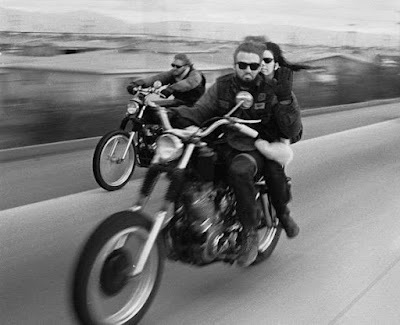 It should come as a surprise to no one who reads this blog that I have never ridden a motorcycle. I have, on the other hand, known a good number of motorcycle enthusiasts, including my childhood next door neighbor, who had been a member of a motorcycle club during his own youth in the '60s. One of the questions I'd eventually ask all these men – and they were always men; I never met a female biker, unless you count my neighbor's wife, who'd sometimes ride along with him – was why they rode and their answer was usually some variation on "I love the freedom."
It should come as a surprise to no one who reads this blog that I have never ridden a motorcycle. I have, on the other hand, known a good number of motorcycle enthusiasts, including my childhood next door neighbor, who had been a member of a motorcycle club during his own youth in the '60s. One of the questions I'd eventually ask all these men – and they were always men; I never met a female biker, unless you count my neighbor's wife, who'd sometimes ride along with him – was why they rode and their answer was usually some variation on "I love the freedom."As if to confirm my own lack of cool, I can't deny that this answer used to baffle me a little bit. Even in 1970s America, which was vastly less obsessed with safety than today, there was already public concern about the deadliness of motorcycles. Consequently, my youthful self absorbed the notion that motorcycles were coffins on two wheels, a notion reinforced by my neighbor's accident, which left him on crutches for a long time and eventually led to his trading his Triumph bike for a "cage."
"Cage" is a relevant bit of slang to this discussion, because it touches on the sense that an automobile is a prison of sorts, trapping the driver inside, and taking away his freedom. I'm not all that fond of cars – even less so since I was hit by one the day before my fiftieth birthday – so even the thought of speeding down the highway with only my clothes and a helmet to protect me is terrifying. But I suppose one man's terror is another man's freedom, or at least that's the impression I've got from talking to avid motorcyclists over the course of my life.
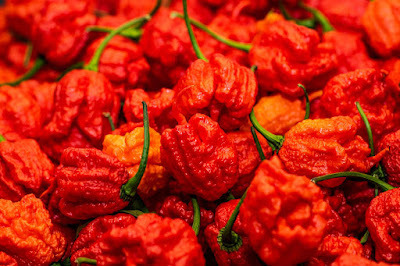 Shortly before my parents were married, my father was inducted into the US Army and received orders to go to Fort Huachuca in southern Arizona, a very short distance from the Mexican border. So, for their honeymoon, he and my mother drove across the country to reach his posting, along the way stopping at a number of fascinating places. This trip, as well as a later one that took my parents to a NATO Joint Forces base in the Netherlands, profoundly affected my father for the rest of his life, largely, I think, because he got to see more of the world than he otherwise would have.
Shortly before my parents were married, my father was inducted into the US Army and received orders to go to Fort Huachuca in southern Arizona, a very short distance from the Mexican border. So, for their honeymoon, he and my mother drove across the country to reach his posting, along the way stopping at a number of fascinating places. This trip, as well as a later one that took my parents to a NATO Joint Forces base in the Netherlands, profoundly affected my father for the rest of his life, largely, I think, because he got to see more of the world than he otherwise would have.One lasting effect was on my Dad's taste in food. He came to love spicy foods, no doubt due to his proximity to Mexico during the first part of his military tour. He passed that love down to me. Judging by what I see on grocery store shelves and on restaurant menus, the love of spicy food seems increasingly commonplace. Nowadays, you can find spiced-up versions of just about anything, from baked goods to desserts to drinks. I've seen jalapeño and chipotle-spiced chocolate, for example, and these are pretty ordinary compared to some of the other foods out there.
Indeed, there seems to be an arms race when it comes to spiciness, with ever more absurdly hot peppers being cross-bred and used for sauces and flavoring. I'm talking peppers rated a million Scoville units or more – stuff that can literally harm your body in certain cases. As I said, I enjoy spicy foods quite a lot, but I simply don't see the appeal of eating peppers so spicy that I doubt one's taste buds can even register their flavor – but maybe that's not the point. Maybe the point is simply to experience something unique, even extreme by the standards of everyday 21st century life.
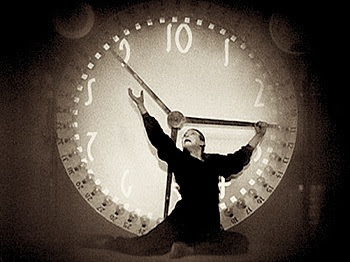 In one of his letters to H.P. Lovecraft, Robert E. Howard wrote:
In one of his letters to H.P. Lovecraft, Robert E. Howard wrote:“I think the real reason so many youngsters are clamoring for freedom of some vague sort, is because of unrest and dissatisfaction with present conditions; I don't believe this machine age gives full satisfaction in a spiritual way, if the term may be allowed.”
As one might expect from the creator of the legendary wanderer, Conan the Cimmerian, Howard devoted much thought to the question of freedom and its importance to the well-being of the individual in an increasingly, as he called it, "machine age," by which he meant the ever more regulated, narrow, and "safe" world that was already being birthed during his lifetime. That's why he "yearn[ed] for the days of the early frontier, where men were more truly free than at any other time or place in the history of the world."
Whether one agrees with him or not is immaterial. What's important to remember is that Howard very much believed this and nearly all of his fiction was an attempt to transport readers – and I daresay himself – to times and places that were, in his judgment, freer and, therefore, uplifting to the human spirit. Again, one can quibble as to how well REH achieved this emancipatory goal, but there can be no question in my mind that he saw literature as a possible means of escape from the soul-crushing drudgery of the modern world.
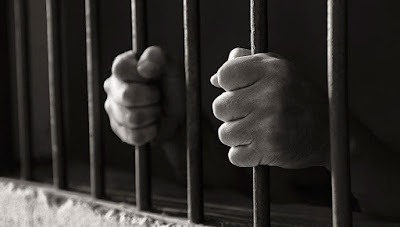 "Who are the people most opposed to escapism? Jailers!" That sentiment, or others similar to it, is often attributed to J.R.R. Tolkien, though other authors (C.S. Lewis, Arthur C. Clarke, et al.) sometimes take his place. Regardless of its origin, it's an interesting point of view and that, I suspect, with some minor caveats Robert E. Howard would have agreed with, as might bikers and pepper-eaters – and roleplayers.
"Who are the people most opposed to escapism? Jailers!" That sentiment, or others similar to it, is often attributed to J.R.R. Tolkien, though other authors (C.S. Lewis, Arthur C. Clarke, et al.) sometimes take his place. Regardless of its origin, it's an interesting point of view and that, I suspect, with some minor caveats Robert E. Howard would have agreed with, as might bikers and pepper-eaters – and roleplayers.I sometimes find myself wondering if the growth in the popularity of not just tabletop RPGs, but fantasy more generally, is a symptom of a larger malaise with modernity, specifically its lack of frontiers or places to adventure. When I was a kid in the '70s, it was still possible – just barely – for me to imagine the opening up of our solar system (and beyond) for exploration. Now, though, I think that's probably a pipe dream, something confined to the realm of science fiction rather than reality.
I'm grateful I had those dreams of traveling to the Moon or Mars when I was younger, just as I'm grateful for the escape provided, then and now, by roleplaying games. Perhaps it speaks poorly of me that I consider many of my RPG experiences as among the most fulfilling and indeed liberating ones I've had in my life. They're not the only ones, of course, but that doesn't change the fact that they've been immensely important to me and, I know, to many of my friends as well.
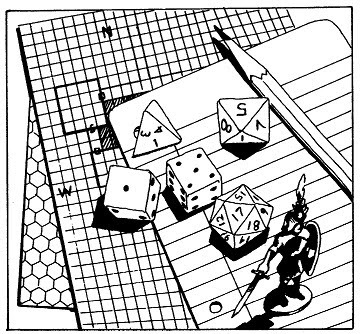
James Maliszewski's Blog
- James Maliszewski's profile
- 3 followers



